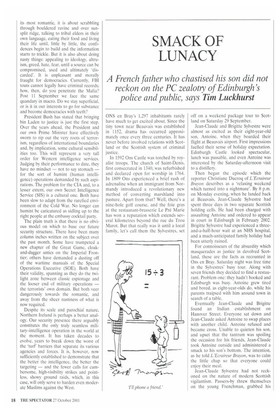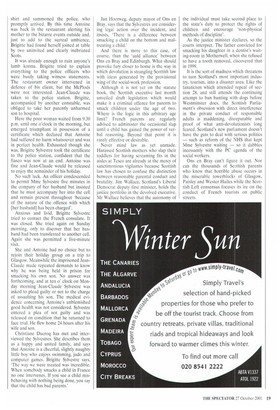SMACK OF LUNACY
A French father who chastised his son did not reckon on the PC zealotg of Edinburgh's
police and public, says Tim Luckhurst
ONS en Bray's 1.297 inhabitants rarely have much to get excited about. Since the tiny town near Beauvais was established in 1152, drama has occurred approximately once every three centuries. It has never before involved relations with Scotland or the Scottish system of criminal justice.
In 1592 Ons Castle was torched by royalist troops. The church of Saint-Denis, first consecrated in 1340, was refurbished and declared open for worship in 1764. In 1809 Ons experienced a brief rush of adrenaline when an immigrant from Normandy introduced a revolutionary new method of converting marshland into pasture. Apart from that? Well, there's a nine-hole golf course, and the foie gras at the restaurant-brasserie Le Pre Marie has won a reputation which extends several kilometres beyond the rue du Trou Marot. But that really was it until a local family, let's call them the Sylvestres, set off on a weekend package tour to Scotland on Saturday 29 September.
Jean-Claude and Brigitte Sylvestre were almost as excited as their eight-year-old son, Antoine, when they boarded their flight at Beauvais airport. First impressions fuelled their sense of holiday expectation. Edinburgh Castle looked spectacular, lunch was passable, and even Antoine was interested by the Saturday-afternoon visit to a distillery.
Then began the episode which the reporter Christiane Ducroq of L'Ecraireur Brayon describes as a 'relaxing weekend which turned into a nightmare'. By 8 p.m. on Monday evening, when he landed back at Beauvais, Jean-Claude Sylvestre had spent three days in two separate Scottish holding cells. He had been charged with assaulting Antoine and ordered to appear in court in Edinburgh in February 2002, Brigitte Sylvestre had experienced a threeand-a-half-hour wait at an NHS hospital, and a much-anticipated family holiday had been utterly ruined.
For connoisseurs of the absurdity which masquerades as justice in devolved Scotland, these are the facts as recounted in Ons en Bray. Saturday night was free time in the Sylvestres' busy tour. Along with seven friends they decided to find a restaurant. Problem one: they hadn't booked and Edinburgh was busy. Antoine grew tired and bored, as eight-year-olds do, while his parents traipsed with him around town in search of a table.
Eventually Jean-Claude and Brigitte found an Indian establishment on Hanover Street. Everyone sat down and Jean-Claude asked Antoine to swap places with another child. Antoine refused and became cross. Unable to quieten his son, and upset that the tantrum was spoiling the occasion for his friends, Jean-Claude took Antoine outside and administered a smack to his son's bottom. The intention, as he told L'Ecraireur Brayon, was to calm the little chap so that everyone could enjoy their meal,
Jean-Claude Sylvestre had not reckoned on the nature of modern Scottish vigilantism. Passers-by threw themselves on the young Frenchman, grabbed his shirt and summoned the police, who promptly arrived. By this time Antoine was back in the restaurant alerting his mother to the bizarre events outside and, just to add to the surreal ambience, Brigitte had found herself joined at table by two uninvited and clearly inebriated Scots.
It was already enough to ruin anyone's lamb karma. Brigitte tried to explain everything to the police officers who were busily taking witness statements. The restaurant owner intervened in defence of his client, but the McPlods were not interested. Jean-Claude was taken to the police station. Brigitte, accompanied by another constable, was obliged to take her patently unharmed son to hospital.
Here the poor woman waited from 9.30 p.m. until one o'clock in the morning, but emerged triumphant in possession of a certificate which declared that Antoine had suffered no harm whatsoever and was in perfect health. Exhausted though she was, Brigitte Sylvestre took the certificate to the police station, confident that the fiasco was now at an end. Antoine was fine and Jean-Claude would be released to enjoy the remainder of his holiday.
No such luck. An officer condescended to permit Mme Sylvestre five minutes in the company of her husband but insisted that he must accompany her into the cell and remain present throughout 'because of the nature of the offence with which [her husband] has been charged'.
Anxious and livid, Brigitte Sylvestre tried to contact the French consulate. It was closed. She tried again on Sunday morning, only to discover that her husband had been transferred to another cell. Again she was permitted a five-minute visit.
She and Antoine had no choice but to rejoin their holiday group on a trip to Glasgow. Meanwhile the imprisoned JeanClaude made repeated demands to know why he was being held in prison for smacking his own son. No answer was forthcoming, and at ten o' clock on Monday morning Jean-Claude Sylvestre was asked to plead guilty or not to the charge of assaulting his son. The medical evidence concerning Antoine's unblemished good health was not considered. Sylvestre entered a plea of not guilty and was released on condition that he returned to face trial. He flew home 24 hours after his wife and son.
Christiane Ducroq has met and interviewed the Sylvestres. She describes them as a happy and united family, and says that Antoine is a cheerful, slightly naughty little boy who enjoys swimming, judo and computer games. Brigitte Sylvestre says, 'The way we were treated was incredible. When somebody smacks a child in France no one intervenes. If you see a child misbehaving with nothing being done, you say that the child has bad parents.' Jan Hoomeg, deputy mayor of Ons en Bray, says that the Sylvestres are considering legal action over the incident, and insists, 'There is a difference between smacking a child on the bottom and maltreating a child.'
And there is more to this case, of course, than the `auld alliance' between Ons en Bray and Edinburgh. What should provoke fury closer to home is the way in which devolution is strangling Scottish law with ideas generated by the provisional wing of the social-work profession.
Although it is not yet on the statute book. the Scottish executive last month unveiled draft legislation which would make it a criminal offence for parents to smack children under the age of two. Where is the logic in this arbitrary age limit? French parents are regularly advised to administer the occasional slap until a child has gained the power of verbal reasoning. Beyond that point it is rarely effective or desirable.
Never mind law as yet unmade. Harassed Scottish mothers who slap their toddlers for having screaming fits in the aisles at Tesco are already at the mercy of sanctimonious vigilantes because Scottish law has chosen to confuse the distinction between reasonable parental conduct and brutality. Jim Wallace, Scotland's Liberal Democrat deputy first minister, holds the justice portfolio in the devolved executive. Mr Wallace believes that the autonomy of the individual must take second place to the state's duty to protect the rights of children and encourage 'non-physical methods of discipline'.
As the justice minister declares, so the courts interpret. The father convicted for smacking his daughter in a dentist's waiting-room in Motherwell, when she refused to have a tooth removed, discovered that in 1999.
It is the sort of madness which threatens to turn Scotland's most important industry, tourism, into a disaster area. Like the fanaticism which attended repeal of section 28, and still attends the continuing attempt to ban hunting with dogs before Westminster does. the Scottish Parliament's obsession with direct interference in the private conduct of responsible adults is maddening, disreputable and proof of what anti-devolutionists long feared. Scotland's new parliament doesn't have the guts to deal with serious politics — such as reform of the NHS that kept Mme Sylvestre waiting — so it dabbles incessantly with the PC agenda of the social workers.
Ons en Bray can't figure it out. Nor can the thousands of Scottish parents who know that horrible abuse occurs in the miserable towerblocks of Glasgow, Paisley and Wester Hailes while the Scottish Left consensus focuses its ire on the conduct of French tourists on public streets.











































































 Previous page
Previous page